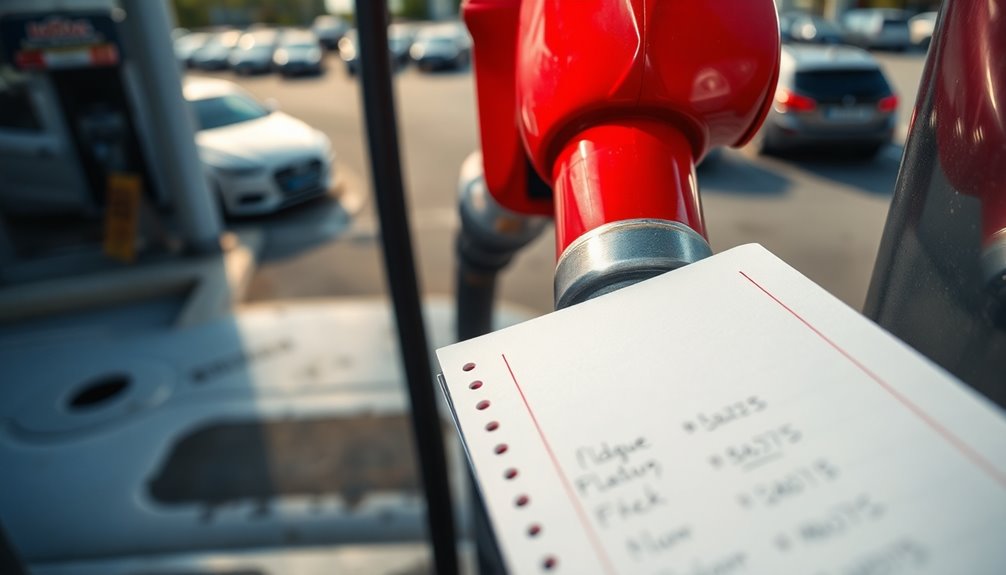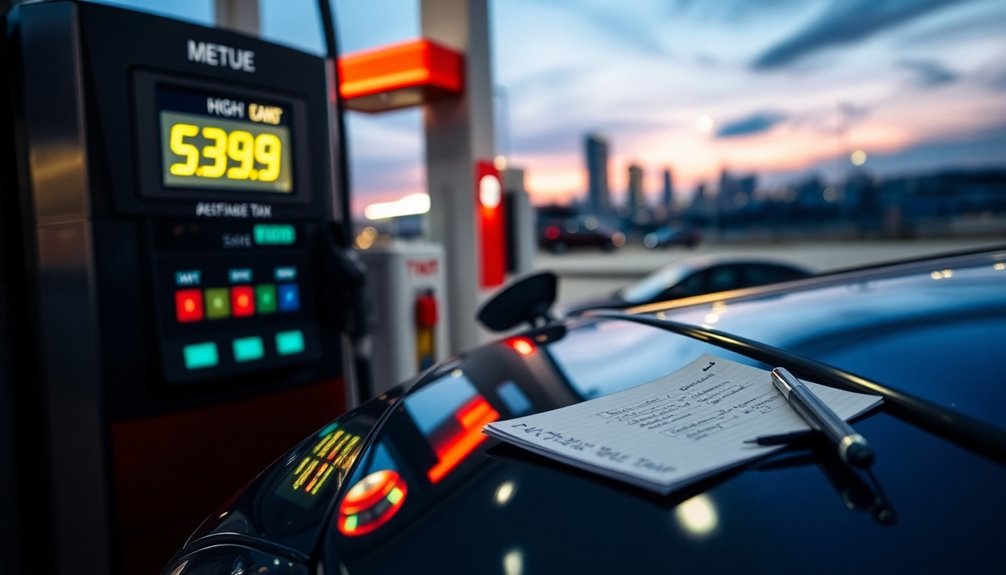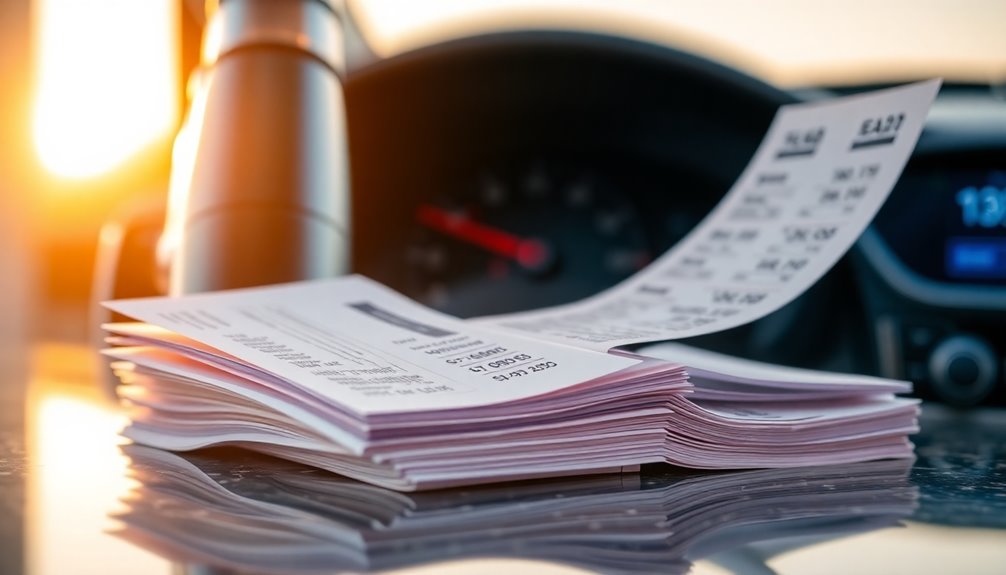You can write off gas expenses on your taxes if you're using your vehicle primarily for business. This deduction is available for self-employed individuals, freelancers, and small business owners, among others. To claim it, you can choose between the Actual Expense Method, which requires detailed records, or the Standard Mileage Rate Method, which simplifies tracking with just a log of business miles. Keep in mind that one-off commutes aren't deductible. Thorough documentation is crucial for your deductions to withstand IRS scrutiny. There's much more to explore about maximizing these deductions and avoiding common pitfalls.
Key Takeaways
- Self-employed individuals can write off gas expenses if the vehicle is primarily used for business purposes, excluding commuting miles.
- Deductible vehicle expenses include fuel, insurance, maintenance, and tolls, but commuting costs are not eligible.
- Two methods for deducting gas expenses are the Actual Expense Method and the Standard Mileage Rate Method, with detailed records required for both.
- Accurate documentation, including gas receipts and a mileage log, is essential for substantiating gas expense claims to the IRS.
- Gas expenses are reported on Schedule C (Form 1040) for self-employed individuals, and consistent reporting methods are crucial for compliance.
Who Can Deduct Gas Expenses

If you're a self-employed worker, independent contractor, or small business owner, you may qualify to deduct gas expenses on your taxes. This deduction isn't just for anyone; it's specifically for individuals who use their vehicles primarily for business purposes. Freelancers and sole proprietors, along with certain professionals like armed forces reservists and qualifying performing artists, can benefit as well.
However, there are conditions. Commuting miles don't count, so you can only deduct trips related to your main job or side gigs. You'll need to keep detailed records of your business use, showing how much you drive for work versus personal use. Gas expenses can be deductible for business use if your vehicle is primarily used for business purposes.
If you're a fee-basis state or local government official or someone with unreimbursed travel expenses in specific professions, you can also take advantage of this deduction.
Make sure to document your gas purchases, dates, business destinations, and the purposes of your trips. Keeping a logbook or diary of your vehicle use along with receipts will help you substantiate your claims.
With the right documentation, you can maximize your deductions and lower your tax liability.
Methods for Deducting Expenses

Understanding how to deduct gas expenses is vital for maximizing your tax benefits. You have two primary methods to choose from: the Actual Expense Method and the Standard Mileage Rate Method.
With the Actual Expense Method, you need to maintain detailed records of all gas purchases, including dates and business purposes. Calculate the percentage of your vehicle use for business by dividing business miles by total miles driven. Multiply your total gas expenses by this percentage to find your deductible amount. Additionally, it's important to remember that the IRS sets the standard mileage rate annually, influencing your potential deductions.
Don't forget to include other vehicle expenses like insurance and maintenance.
Alternatively, the Standard Mileage Rate Method simplifies things. Just track your business miles using a mileage log or app. Multiply those miles by the IRS's standard mileage rate, which includes gas and other vehicle expenses, so you can't deduct them separately.
You can still deduct parking fees and tolls.
When deciding between the two methods, compare the total deductions. While the Actual Expense Method may offer higher deductions with detailed tracking, the Standard Mileage Rate is simpler.
Choose the one that benefits you most while ensuring you keep thorough records to back up your deductions.
Types of Deductible Vehicle Expenses

When it comes to deducting vehicle expenses on your taxes, knowing the different types of deductible costs can help you maximize your savings.
First up are fuel and operational costs. You can deduct expenses like gasoline, diesel fuel, oil, tires, and repairs and maintenance. These everyday expenses can really add up! Additionally, proper documentation is essential for claiming these travel-related expenses.
Next, consider insurance and registration fees. You can write off your car insurance, registration fees, licenses, title fees, and tags. These costs are essential for operating your vehicle legally and safely.
Then, there's depreciation and financing. If you own your vehicle, you can deduct depreciation, loan interest, and lease payments. Additionally, costs like garage rent and parking fees can also be included.
Lastly, don't forget miscellaneous expenses. Tolls, parking fees, bridge and tunnel tolls, and even car washing and polishing (if you're using the actual expense method) can all be written off.
Also, depreciation on vehicle accessories can be considered.
Documentation Requirements

Keeping thorough documentation is crucial for claiming gas expenses on your taxes. Start by recording the date of each gas purchase, the amount spent, and the business purpose of your trip. It's also essential to track your total miles driven for the year and specifically for business use. Maintain a detailed log or diary of your vehicle use. This should include dates of business trips, destinations, the purpose of each trip, and odometer readings. Consistent record-keeping will help you substantiate your claims. Don't forget to save all your gas receipts. If any get lost, bank or credit card statements can serve as supporting evidence. In some cases, having written statements or oral testimony from third parties can be beneficial. Additionally, keep records of other vehicle-related expenses, like maintenance and insurance. The IRS mileage rate applies under an accountable plan, making it important to track your mileage accurately to maximize deductions. Preparation for an audit is important, so ensure your records are accurate and detailed. Aim to keep these records for at least three years. Consider using digital expense management tools for easier tracking. Lastly, establish a system to track and verify the percentage of business use to support your deductions.
Tax Return Reporting

Reporting gas expenses on your tax return can feel overwhelming, but it doesn't have to be. If you're self-employed, you can deduct actual vehicle expenses, including gas, on Schedule C (Form 1040). First, calculate the business use percentage of your vehicle to determine how much of your gas expenses are deductible. Keep detailed records of each gas purchase, noting the date, amount, and business purpose.
While employees generally can't deduct unreimbursed business expenses, there are exceptions for specific groups, such as Armed Forces reservists. If you're in one of those categories, you may use Form 2106 to report your vehicle expenses, though it's less common. Additionally, using the standard mileage rate may be beneficial for maximizing deductions in your first year of business vehicle use.
Make sure to maintain a mileage log to substantiate your business use percentage, and don't forget to keep supplementary documents handy in case the IRS requests more information.
Consistency is key, so stick to the same reporting method each year to avoid complications. If you lose receipts, bank or credit card statements can serve as alternative documentation.
Standard Mileage Rate Explained

Understanding the standard mileage rate can simplify how you deduct vehicle expenses on your tax return. This rate, set by the IRS, determines the default cost per mile for using your personal vehicle for business, charitable, or medical purposes.
For 2024, the mileage rates are 67 cents for business use, 21 cents for medical or moving purposes, and 14 cents for charitable purposes. The IRS determines mileage rates based on various factors, including costs associated with vehicle operation.
You can apply the standard mileage rate to any type of vehicle, whether it's gas-powered, electric, or hybrid. It covers both fixed and variable costs for business use, but only variable costs for medical and moving purposes.
However, keep in mind that commuting to your regular workplace isn't deductible.
To use this method, you must apply it in the first year you use your vehicle for business. You can use it for up to four vehicles, and no receipts are needed—just maintain a mileage log.
The standard mileage rate encompasses all your vehicle expenses, meaning you can't separately deduct additional costs. By understanding this rate, you can effectively manage your vehicle-related deductions.
Actual Vehicle Expenses Method

The actual vehicle expenses method allows you to maximize your tax deductions by tracking all related costs associated with your vehicle. Anyone can use this method if they keep detailed records of all vehicle expenses. You'll need to calculate total expenses, including gas, depreciation, insurance, maintenance, registration fees, and personal property taxes, then multiply by the percentage of business use. While this method can yield larger deductions than the standard mileage rate, it's more complex. You must maintain accurate records for at least three years in case of an audit. Using a mileage tracker app can help you categorize trips as business or personal, which is crucial for determining your business-use percentage. Additionally, the IRS recommends calculating deductions using both methods for optimal results.
Tracking Gas and Vehicle Expenses
Tracking gas and vehicle expenses is vital for maximizing your tax deductions. Accurate records of all vehicle expenses, including gas receipts, are mandatory for IRS compliance. You need to document the date, amount, and business purpose of each gas purchase.
Additionally, maintaining a mileage log is essential to establish the percentage of miles driven for business use. For every trip—whether it's deliveries, customer appointments, or supply pickups—you must record the mileage. You can use a logbook, a notebook, or even an app to track your trips. Comprehensive mileage logs should include details like date, odometer readings, destination, and purpose.
Categorizing trips as business or personal ensures accuracy in your mileage log. If you prefer, GPS technology can automatically track mileage, offering precise data on distance traveled and trip duration.
Make sure to store gas receipts either in a logbook or digitally, so you don't lose them. Keep receipts organized and include details like quantity, price, and odometer reading.
Tools for Expense Management

Effective tools for expense management can significantly simplify your financial tracking process. With automated receipt capture, you can effortlessly document your spending as you go. Using your smartphone to snap pictures of receipts means you won't lose track of expenses, and a centralized dashboard keeps everything organized in one place.
You can also set spending limits and company policies, adjusting them whenever necessary to fit your needs. Integration with corporate credit cards streamlines the approval workflows, automatically routing receipts to the right approvers. This helps manage approvals efficiently, flagging any receipts that need extra attention and checking for policy violations.
Scheduling reimbursement checks becomes a breeze, saving you time and effort. Automation boosts efficiency by removing manual processes and improving expense reporting. Automatic categorization helps you quickly sort expenses, while AI can assist in populating prices and expense types, further simplifying the process. Additionally, expense management systems ensure compliance with company policies, providing peace of mind during audits.
These tools are compatible with accounting software like Zoho Books, offering real-time tracking and spend controls. Whether you're a small business or scaling up, user-friendly features make expense reporting seamless, regardless of currency.
Embrace these tools to take control of your finances!
Common Mistakes to Avoid

When it comes to writing off gas expenses on your taxes, overlooking common mistakes can cost you valuable deductions. One major error is forgetting to save gas receipts. These receipts serve as essential proof of your business-related expenses, and without them, substantiating your deductions during an IRS audit becomes challenging.
Make it a habit to save every receipt or consider using digital scanning to keep them organized.
Another pitfall isn't maintaining a mileage log. You need to track the miles driven for business purposes, including odometer readings before and after each trip. This log is crucial for calculating your vehicle's business use percentage and may be requested by the IRS during an audit. Additionally, accurate record-keeping is essential for maximizing your tax deductions.
It's also vital to avoid mixing up business and personal use. Only business miles can be written off, so keep a clear distinction between the two.
Lastly, ensure you have adequate documentation. Detailed records of each gas purchase, including date, amount, and purpose, are necessary. Bank statements can supplement lost receipts, but incomplete documentation can lead to denied deductions. Staying organized and thorough will help you maximize your deductions and avoid unnecessary headaches.
Frequently Asked Questions
Can I Deduct Gas Expenses for Personal Trips?
You can't deduct gas expenses for personal trips.
Deductions only apply to gas used for business-related driving, not for commuting or personal errands.
If you drive for work, keep detailed records of those trips and the gas expenses incurred.
Only business miles count, so maintaining a log will help you track your eligible expenses accurately.
How Do I Calculate Business Use Percentage for Deductions?
To calculate your business use percentage for deductions, start by tracking your business miles driven and total miles for the year.
Divide the business miles by total miles, then multiply by 100 to get the percentage.
For home office deductions, measure your office space and divide it by the total home space, then multiply by 100.
Keep thorough records to support your calculations and ensure you're prepared in case of an audit.
Are There Limits on the Amount I Can Deduct?
Yes, there are limits on the amount you can deduct for vehicle expenses.
If you use the standard mileage rate, you can only claim that set rate per business mile driven, without additional gas deductions.
If you choose the actual expenses method, you can deduct all reasonable and necessary costs, but you must accurately divide expenses between personal and business use.
Keeping detailed records is essential for substantiating your claims during tax time.
What Happens if I Don't Keep Receipts?
If you don't keep receipts, you risk facing serious consequences. Your chances of an audit increase since the IRS requires proof for deductions.
Without proper documentation, substantiating your expenses becomes tough, leading to reduced or disallowed deductions. You might need to rely on alternative records, like bank statements or mileage logs, but these aren't as strong as receipts.
Ultimately, not keeping receipts can cost you valuable tax savings and create unnecessary headaches.
Can I Write off Gas Expenses for a Rental Vehicle?
Yes, you can write off gas expenses for a rental vehicle, but only if you use the vehicle for business purposes.
You'll need to track your mileage and keep detailed records of your gas receipts.
Calculate the business use percentage by dividing business miles by total miles.
Report these expenses under equipment rental or miscellaneous expenses on your tax return, ensuring compliance with IRS regulations to maximize your deductions.
Conclusion
In conclusion, deducting gas expenses on your taxes can be a smart way to reduce your taxable income. Whether you choose the actual vehicle expenses method or the standard mileage rate, make sure you keep accurate records to support your claims. By understanding who can deduct these expenses and the necessary documentation, you can maximize your deductions. Just avoid common mistakes, and you'll be on your way to a smoother tax filing experience.









